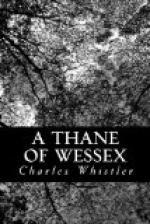This, too, pleased both Alswythe and Wulfhere, who were glad of the addition to our party. So we rode on. But many were the far-off columns of smoke we looked back on beyond Parret, before the hills rose behind us and hid them.
CHAPTER XI. EALHSTAN THE BISHOP.
It was in the late afternoon when we rode into Glastonbury town, past the palisadings of the outer works, and then among cottages, and here and there a timber house of the better sort, till we came to the great abbey. It was not so great then as now, nor is it now as it will be, for ever have pious hands built so that those who come after may have room to add if they will. But it was the greatest building that I had ever seen, and, moreover, of stone throughout, which seemed wonderful to me. And there, too, Wulfhere showed me the thorn tree which sprang from the staff of the blessed Joseph of Arimathea, which flowers on Christmas Day, ever.
Then we came to the nunnery where we should leave Alswythe, and I, for my part, was sorry that the journey was over, sad though it had been in many ways, for when I must leave her I knew not how long it should be, if ever, before I saw her again.
And I think the same thought was in her heart, for, when Wulfhere showed her the great house, she sighed, looking at me a little, and I could say nothing. But she began to thank us two for our care of her, as though we could have borne to take less than we had. And her words were so sweet and gracious that even the old warrior could not find wherewith to answer her, and we both bowed our heads in thanks, and rode, one on each side of her, in silence.
Then she must ask Wulfhere what he would do when she was safely bestowed. And that was a plain question he could answer well.
“Truly, lady, if you will give me leave, I would see Heregar, our master, through whatever comes of his messages.”
Then was I very glad, and the more that, though I might not think myself such, the old warrior would call me his master, for that told me that he had full belief in me.
Yet I could but say: “Friend should you call me, Wulfhere, my good counsellor, not master.”
And I reached out my hand to him, bowing to Alswythe, whose horse’s neck I must cross. And Wulfhere took it, and on our two rough hands Alswythe laid her white fingers, pressing them, and, looking from one to the other, said:
“Two such friends I think no woman ever had, or wiser, or braver. Go on together as you will, and yet forget not me here in Glastonbury.”
Then we loosed our hands, looking, maybe, a little askance, for our Saxon nature will oft be ashamed, if one may call it so, of a good impulse acted on, and Wulfhere said that we must think of those things hereafter.
When we came to the gate there was a little crowd following us, for word had gone round in some way that we were fugitives from Parret side. But Wulfhere had bade the men answer no questions till we had seen the bishop, lest false reports should go about the place. So the crowd melted away soon, and we knocked, asking admission, and showing the letter from the prioress of Bridgwater.




